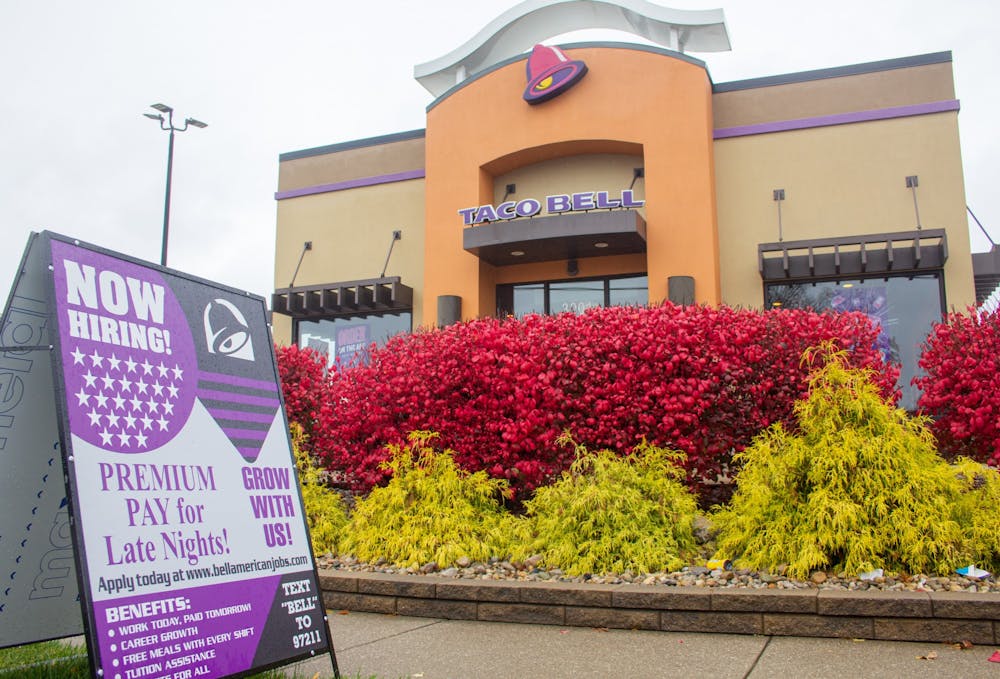In October, 4.6% of Americans were unemployed. While this number was lower than previous months, it still remains higher than the unemployment rate of 3.5% in February 2020.
A 1.1% difference in unemployment doesn’t seem like much until you realize 1.1% of the United States’ unemployed population translates to 1.7 million Americans. In total, 7.4 million Americans are still unemployed, which is about 600,000 more people than Indiana’s population.
While many suggest higher wages will lower unemployment, worries arise with implications of inflation. Instead of simply raising wages, companies must improve working conditions and increase benefits, including paid family leave.
It’s no secret the wait for food seems to exceed 30 minutes both on-campus or off-campus. The lack of workers in the food and retail industry has become so severe that restaurants have cut back on their hours and temporarily closed. Why is this happening?
“Starting wage at $15.”
“Flexible hours, starting at $14.”
“Night shift workers starting at $16.”
These words are plastered on fast food restaurant signs seen as close as on East Third Street. Two years ago, a $15 wage would’ve been offered for a kitchen manager, not a brand new hire.
A CNBC survey reported roughly 90% of CFOs are raising wages.
At first glance, a six-dollar increase in hourly wages would be seen as a great improvement. However, a raise in wages for entry-level workers causes a well-known economic complication: inflation.
Inflation causes the value of a dollar to decrease and the price of necessities such as food, shelter and energy to rise. In June, the U.S. Department of Labor reported consumer prices were 5.4% higher than the year before. Inflation rose even more in October to reach 6.2%, the steepest monthly rise in 30 years according to the U.S. Bureau of Labor Statistics.
If wages are increasing, then why is it such a problem if the cost of living increases as well? Well, not all wages are increasing. Fast food restaurant wages climbed 10% on average this year.
While raising wages does decrease unemployment, wage increases must be universal to offset inflation. For example, Indianapolis Public School teachers’ wages increased by only 3% this year, but they still have to pay nearly 50% more for gasoline compared to last October. Fast food prices are 7.1% higher this October than they were a year prior, reflecting the largest increase on record.
It’s evident that raising wages can’t completely erase unemployment because businesses respond by raising prices. People understand that with inflation the cost of living has risen, leaving the raised wages almost meaningless.
Instead, businesses should improve the work environment and offer better benefits to attract employees.
Helaine Olen of the Washington Post came to a similar conclusion, saying workers aren’t motivated to come back to work in high-pressure positions for limited benefits including low wages, toxic workplaces and little benefits such as paid leave.
In nearly half of all two-parent households, BBC reports both parents work full time although only 21% of workers have access to paid family leave. This is riveting considering 82% of Americans support paid family leave.
The lack of paid family leave makes child care essential for many. But for some, child care can be unachievable.
“You cannot have workplace participation if you do not have child care,” Amy Jo Hutchinson said in an interview on “The Problem with Jon Stewart.”
In West Virginia, the amount of money it costs for a family to have one child in private day care is greater than the cost of West Virginia University or Marshall University for one year, Hutchinson said.
The unemployment crisis won’t be solved solely by increasing wages. There must also be a push for better work environments and more benefits.
A 30-minute wait in the Taco Bell drive-through can be frustrating but assuming the employees are lazy is unfair. Wages are on the rise to combat labor shortages, but to completely reduce wait times, benefits must be improved and a tolerable workplace should be guaranteed for all workers, especially essential workers.
Jacob Spudich (he/him) is a freshman studying journalism and political science. He is a DJ for the WIUX student radio station, a member of Hoosier Health Advocates and a huge Detroit Tigers fan.






